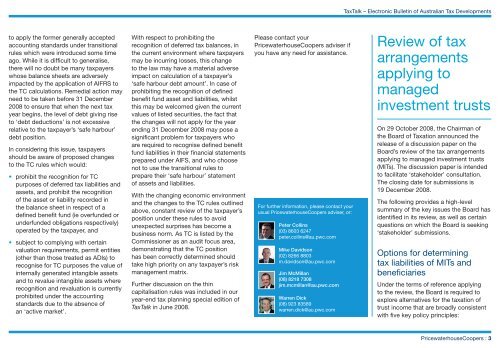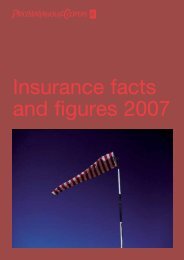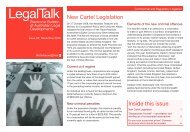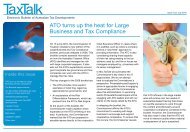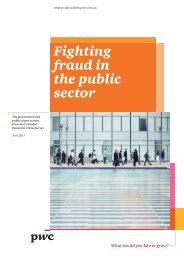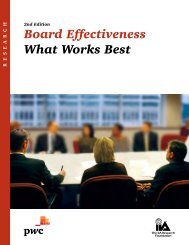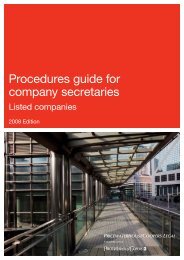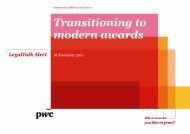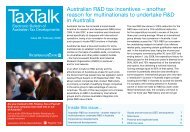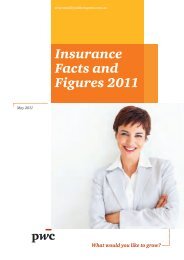Thin capitalisation: eroding asset values and increasing debt ... - PwC
Thin capitalisation: eroding asset values and increasing debt ... - PwC
Thin capitalisation: eroding asset values and increasing debt ... - PwC
Create successful ePaper yourself
Turn your PDF publications into a flip-book with our unique Google optimized e-Paper software.
TaxTalk – Electronic Bulletin of Australian Tax Developments<br />
to apply the former generally accepted<br />
accounting st<strong>and</strong>ards under transitional<br />
rules which were introduced some time<br />
ago. While it is difficult to generalise,<br />
there will no doubt be many taxpayers<br />
whose balance sheets are adversely<br />
impacted by the application of AIFRS to<br />
the TC calculations. Remedial action may<br />
need to be taken before 31 December<br />
2008 to ensure that when the next tax<br />
year begins, the level of <strong>debt</strong> giving rise<br />
to ‘<strong>debt</strong> deductions’ is not excessive<br />
relative to the taxpayer’s ‘safe harbour’<br />
<strong>debt</strong> position.<br />
In considering this issue, taxpayers<br />
should be aware of proposed changes<br />
to the TC rules which would:<br />
• prohibit the recognition for TC<br />
purposes of deferred tax liabilities <strong>and</strong><br />
<strong>asset</strong>s, <strong>and</strong> prohibit the recognition<br />
of the <strong>asset</strong> or liability recorded in<br />
the balance sheet in respect of a<br />
defined benefit fund (ie overfunded or<br />
underfunded obligations respectively)<br />
operated by the taxpayer, <strong>and</strong><br />
• subject to complying with certain<br />
valuation requirements, permit entities<br />
(other than those treated as ADIs) to<br />
recognise for TC purposes the value of<br />
internally generated intangible <strong>asset</strong>s<br />
<strong>and</strong> to revalue intangible <strong>asset</strong>s where<br />
recognition <strong>and</strong> revaluation is currently<br />
prohibited under the accounting<br />
st<strong>and</strong>ards due to the absence of<br />
an ‘active market’.<br />
With respect to prohibiting the<br />
recognition of deferred tax balances, in<br />
the current environment where taxpayers<br />
may be incurring losses, this change<br />
to the law may have a material adverse<br />
impact on calculation of a taxpayer’s<br />
‘safe harbour <strong>debt</strong> amount’. In case of<br />
prohibiting the recognition of defined<br />
benefit fund <strong>asset</strong> <strong>and</strong> liabilities, whilst<br />
this may be welcomed given the current<br />
<strong>values</strong> of listed securities, the fact that<br />
the changes will not apply for the year<br />
ending 31 December 2008 may pose a<br />
significant problem for taxpayers who<br />
are required to recognise defined benefit<br />
fund liabilities in their financial statements<br />
prepared under AIFS, <strong>and</strong> who choose<br />
not to use the transitional rules to<br />
prepare their ‘safe harbour’ statement<br />
of <strong>asset</strong>s <strong>and</strong> liabilities.<br />
With the changing economic environment<br />
<strong>and</strong> the changes to the TC rules outlined<br />
above, constant review of the taxpayer’s<br />
position under these rules to avoid<br />
unexpected surprises has become a<br />
business norm. As TC is listed by the<br />
Commissioner as an audit focus area,<br />
demonstrating that the TC position<br />
has been correctly determined should<br />
take high priority on any taxpayer’s risk<br />
management matrix.<br />
Further discussion on the thin<br />
<strong>capitalisation</strong> rules was included in our<br />
year-end tax planning special edition of<br />
TaxTalk in June 2008.<br />
Please contact your<br />
PricewaterhouseCoopers adviser if<br />
you have any need for assistance.<br />
For further information, please contact your<br />
usual PricewaterhouseCoopers adviser, or:<br />
Peter Collins<br />
(03) 8603 6247<br />
peter.collins@au.pwc.com<br />
Mike Davidson<br />
(02) 8266 8803<br />
m.davidson@au.pwc.com<br />
Jim McMillan<br />
(08) 8218 7308<br />
jim.mcmillan@au.pwc.com<br />
Warren Dick<br />
(08) 923 83589<br />
warren.dick@au.pwc.com<br />
Review of tax<br />
arrangements<br />
applying to<br />
managed<br />
investment trusts<br />
On 29 October 2008, the Chairman of<br />
the Board of Taxation announced the<br />
release of a discussion paper on the<br />
Board’s review of the tax arrangements<br />
applying to managed investment trusts<br />
(MITs). The discussion paper is intended<br />
to facilitate ‘stakeholder’ consultation.<br />
The closing date for submissions is<br />
19 December 2008.<br />
The following provides a high-level<br />
summary of the key issues the Board has<br />
identified in its review, as well as certain<br />
questions on which the Board is seeking<br />
‘stakeholder’ submissions.<br />
Options for determining<br />
tax liabilities of MITs <strong>and</strong><br />
beneficiaries<br />
Under the terms of reference applying<br />
to the review, the Board is required to<br />
explore alternatives for the taxation of<br />
trust income that are broadly consistent<br />
with five key policy principles:<br />
PricewaterhouseCoopers :


